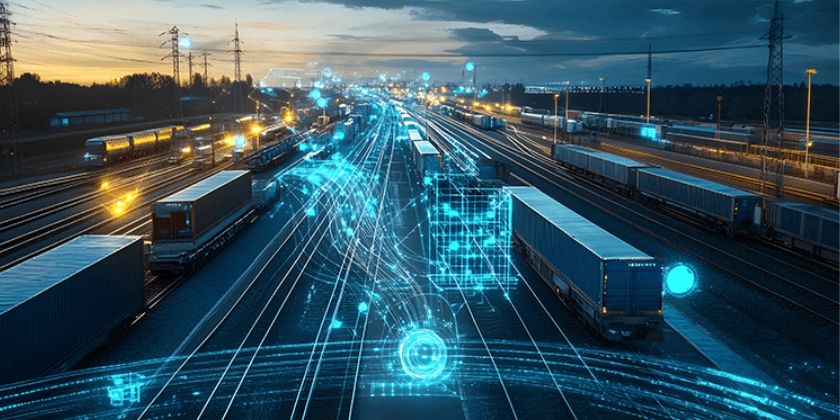
The logistics industry is entering a new era – one defined by integration, automation, and innovation. In 2025, fragmented systems and disjointed processes will no longer suffice in the face of rising customer expectations, growing complexity, and the demand for faster, more sustainable supply chains.
Integrated logistics is the answer. By connecting people, systems, and data into a seamless ecosystem, businesses can unlock new levels of efficiency, visibility, and performance. But the question remains: Is your business ready for this transformation?
Integrated Logistics: Benefits, Insights and Strategies
What Is Integrated Logistics?
At its core, integrated logistics is creating a single, connected framework for managing your supply chain. Instead of juggling multiple systems for freight management, claims, audit, and analytics, integration brings it all together. This approach ensures:
- Real-time communication between systems.
- Centralized data access for faster, more informed decisions.
- Streamlined operations, reducing redundancies and errors.
In 2025, integration will no longer be optional – it will be the standard for businesses looking to remain competitive.
Why 2025 Is the Year for Integration?
Several trends are converging to make 2025 the tipping point for integrated logistics:
1. Rising Customer Expectations
Consumers and businesses alike demand faster deliveries, real-time tracking, and seamless experiences. Integrated logistics enables companies to meet these expectations with ease.
2. Increasing Complexity
Global supply chains are growing more intricate, with evolving regulations, multiple carrier networks, and diverse customer needs. Integration simplifies these complexities by offering a unified platform to manage it all.
3. Advancements in Technology
Emerging technologies like AI, IoT, and blockchain are driving the shift toward integrated systems. Businesses that adopt these technologies will gain a significant edge.
4. Sustainability Requirements
Integrated logistics helps businesses track and reduce their carbon footprint, aligning with global sustainability goals and customer demands for greener operations.
The Benefits of Embracing Integrated Logistics
1. End-to-End Visibility
With integrated logistics, you’ll gain a 360-degree view of your supply chain, from procurement to final delivery. This visibility allows you to:
- Spot bottlenecks and inefficiencies in real time.
- Make proactive decisions to avoid disruptions.
- Deliver consistent, accurate updates to customers.
2. Improved Efficiency
Fragmented systems lead to duplicated efforts and manual errors. Integration eliminates these pain points by automating processes and centralizing workflows, resulting in:
- Faster order processing and delivery.
- Reduced administrative workload.
- Lower operational costs.
3. Cost Optimization
Integrated logistics simplifies cost management by providing real-time insights into freight spend, claims recovery, and carrier performance. This leads to:
- Better rate negotiations with carriers.
- Reduced errors in freight audits.
- Improved ROI across your supply chain.
4. Scalability for Growth
As your business expands, so does the complexity of your logistics operations. Integrated systems can scale seamlessly, supporting your growth without adding unnecessary overhead or disruptions.
Are You Ready for Integrated Logistics in 2025?
Here are some key questions to assess your readiness:
- Do you have full visibility into your supply chain, or are you relying on disconnected systems?
- Are your logistics processes automated, or is manual work slowing you down?
- Can you quickly adapt to disruptions or changes in customer demand?
- Are you meeting sustainability goals, or are inefficiencies driving up your carbon footprint?
If you answered “no” to any of these questions, it’s time to consider integrating your logistics operations.
How nVision Global Can Help?
At nVision Global, we specialize in transforming fragmented logistics systems into fully integrated ecosystems. Our solutions include:
- Comprehensive TMS integration to manage freight, routing, and tracking in one place.
- Freight audit and payment solutions to ensure accuracy and optimize costs.
- Advanced analytics to provide actionable insights and drive smarter decision-making.
- Sustainability-focused tools to track and reduce your environmental impact.
By partnering with nVision Global, you’ll gain the tools, expertise, and support needed to thrive in the era of integrated logistics.
Conclusion: Don’t Get Left Behind
2025 will mark a turning point for the logistics industry. Businesses that embrace integration will enjoy faster, more efficient supply chains and stronger customer relationships. Those that don’t risk falling behind their competitors.
Is your business ready? Contact nVision Global today to learn how we can help you integrate your logistics operations and prepare for a successful 2025.